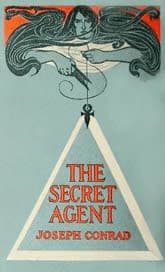The Secret Agent
Critique • Quotes • At the movies
 First U.S. edition, 1907
First U.S. edition, 1907Original title
The Secret Agent: A Simple Tale
First publication
1907
Literature form
Novel
Genre
Literary, crime, espionage
Writing language
English
Author's country
England
Length
Approx. 93,500 words

Suspected terrorist Verloc is questioned as his wife looks on in 1936'sSabotoge.
Filming Conrad's unfilmable classic
Sabotage (1936): Also known as The Woman Alone; film, 76 minutes; director Alfred Hitchcock; writer Charles Bennett; featuring Sylvia Sidney, Oscar Homolka, John Loder
Joseph Conrad's The Secret Agent seems to come into vogue whenever terrorism threatens the western world, though the novel sheds little light on the motivation of modern-day terrorists or on our recent wars on terrorism. Some of the movies based on the novel seem content to accept the villains as perverse or nasty characters. They prefer to focus on the suspense and personal dramas involved, rather than the political intrigue, which is understandable.
The novel has, in fact, been called unfilmable. The Secret Agent is not nearly as exciting or plot-driven as the title might suggest. It deals rather intensely with the webs of deceit spun by all parties—police, terrorists, politicians and diplomats—without wholeheartedly supporting or condemning any of them.
The solution found by some filmmakers has been to revise the story to emphasize the cops-and-criminals story and to cast a clearer moral light over the characters' machinations.
And it works. To varying degrees. As we can see in treatments produced over an eighty-year period, starting with the earliest adaptation made three decades after the book was written.
The novel sabotaged
Alfred Hitchcock's 1936 movie Sabotage bears the same relation to the novel it is based on as his 1935 film The 39 Steps does to John Buchan's novel The Thirty-Nine Steps. Maybe less, considering Hitchcock even changed the name. (The name change was presumably to prevent a mixup with Hitchcock's movie Secret Agent, based on different sources and released earlier in 1936. Though it also leads to further confusions with Hitchcock's different-again 1942 film, Saboteur. Although the American title for Sabotage, namely The Woman Alone, should prevent that confusion in the U.S. at least. Are we all clear now?)
As with The 39 Steps, Hitchcock's adaptation of The Secret Agent retains only the bare bones of the plot and the main characters, though greatly changed, and builds up the cinematically suspenseful elements. It may be ironic the setting for the conspirators has been moved from a dingy pornographic shop to a respectable community theatre showing Walt Disney cartoons.
The would-be bomb thrower is the theatre owner, now called Karl Anton Verloc. (The name "Adolf" was dropped for reasons that would have been obvious in 1936.) He's played by Oscar Homolka, an Austrian-born actor who looks like Leonid Brezhnev and often played Soviet heavies.
It's never clear what motivates the conspirators. The involvement of Russian diplomats and agents in the 1907 novel is gone. There's barely a hint that some other European power is behind the terrorists, and no indication of ideology, anarchist or otherwise, although some reviewers detect a Nazi element. It seems enough for Hitchcock though that some unidentified men meet in secret to set their plots—and the movie plot—in action.
The film opens with a weak attempt at sabotage that shuts down electricity in London for a few minutes. Next up is a plan to set off a bomb in an underground station. (The target in the novel is the Greenwich Observatory.) But once the cabal realize they are being watched by an undercover Scotland Yard cop, who has made friends with Verloc's innocent wife (American actress Sylvia Sidney) and her young brother, they scatter.
The rest of the story focuses on suspense and action—Verloc acquiring the bomb from its maker, figuring out how to smuggle it out of the cinema past the police, the boy unwittingly carrying the bomb, Mrs. Verloc confronting her murderous husband, the police running down the bomb-maker at the theatre, as he threatens to blow the building up....
A wife gets her revenge in Sabotage, Alfred Hitchcock's adaptation of The Secret Agent.
The undercover policeman is a square-jawed, decent sort, unlike the novel's conflicted officers, and his biggest concern seems to be to save Mrs. Verloc. In another major departure from the book, he succeeds in doing so and the story has a partially happy ending.
Like The 39 Steps before it, Sabotage is a good, if not great, and enjoyable Hitchcock film during his British period. But it's a terrible book adaptation. Quite apart from the changes in details, the movie doesn't get across any of the feeling, atmosphere or insight into human nature that Conrad excels at revealing.
But perhaps this is the smartest way to handle an adaptation of a Joseph Conrad novel. At least watching the film will not detract from your enjoyment of the book—as it comes across as unrelated except for a few seemingly coincidental names and plot points.
— Eric

